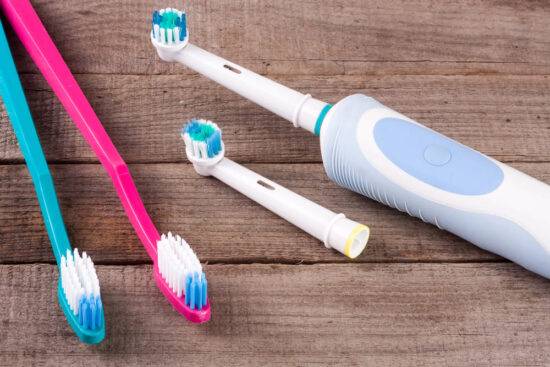
Choosing the right toothbrush can feel a little overwhelming, especially since there are so many options available these days—manual, electric, soft bristles, angled heads, sonic technology, etc.
But there’s no reason to worry! Simply take some time to do some research and speak with a hygienist in Millwoods if you have any questions or concerns. These measures will help you feel more informed and enable you to make the right decision for your smile.
Manual vs. Electric: Which Toothbrush Wins?
The two main types of toothbrushes are electric and manual. It’s important to keep in mind that there is no such thing as a “one-size-fits-all” toothbrush; there are advantages and disadvantages to each one, and the most appropriate choice depends on several factors, including your specific dental needs, lifestyle, budget, and personal preferences.
Manual Toothbrushes
Good old-fashioned manual toothbrushes have been around for decades. They’re extremely easy to use – just pick up and start! – and widely available.
Pros:
- Cost-Effective: Cheap and easy to find at drugstores, grocery stores, and even convenience stores.
- Portable: Great for travel—no batteries or charging required.
- Control: Some people prefer the ability to control the pressure exerted on their teeth and gums through their own efforts.
Cons:
- Technique Matters: You need to be diligent about brushing for the full two minutes.
- Harder to Reach Areas: Handheld toothbrushes may not clean as thoroughly in tricky spots, like behind molars.
Best For: People with good daily brushing habits and abide by the proper brushing techniques.
Electric Toothbrushes
Electric toothbrushes are powered either by batteries or a charger and come with rotating, oscillating, or vibrating heads to provide you with a more thorough clean.
Pros:
- Effectively Removes Plaque: Studies have shown that electric toothbrushes can scrub away plaque and tartar more efficiently, thereby reducing the chances of gingivitis from occurring.
- Built-in Timers: Helps ensure that you brush for the recommended two minutes.
- Great for People with Limited Mobility: The brush does most of the work, meaning this is an ideal option for those dealing with arthritis, braces, or anyone who struggles with fine motor control.
Cons:
- More Expensive: Purchasing an electric brush as well as replacement heads can be more expensive.
- Requires Charging or Batteries: Not always convenient for travel since the toothbrush’s power only lasts for a certain amount of time.
Best For: Anyone who wants a more comprehensive cleaning that requires less effort or tends to rush their brushing.
What to Look for When Getting a Toothbrush
Regardless of whether you opt for a manual or electric brush, keep the following features in mind when shopping and, if you need any other advice, be sure to speak with a hygienist near you.
- Soft Bristles — These are gentle on the gums but still able to eliminate debris plaque.
- Comfortable Handle — You’ll use your brush at least twice a day, so comfort counts!
- CDA Seal of Approval: The Canadian Dental Association reviews toothbrushes for safety and effectiveness.
It’s also good to remember that toothbrushes with smaller heads make it easier to reach the back of your mouth and clean around all your teeth.
How Often Should You Replace Your Toothbrush?
Did you know that your toothbrush should be replaced regularly? The general rule of thumb is you should be getting a new one approximately every three months. The brush’s bristles wear out, becoming less effective at keeping your smile fresh and bright. Even worse, worn bristles can irritate your gums and miss plaque buildup.
Some signs to indicate it’s time to get a new toothbrush are:
- The bristles are frayed or splayed.
- You’ve been sick (bacteria can hang out on bristles).
- The brush looks or feels worn out before the 3-month mark. (Electric brushes tend to wear out more quickly)
So, Which One is the Best?
The best toothbrush is the one you’ll actually use. But with that said, the most ideal toothbrush depends on you! If you’re a consistent brusher and try your best to practice good technique, a manual brush may be all you need. On the other hand, if you’re looking for an upgrade, have braces, or want an easier way to engage in good habits, an electric toothbrush might be the way to go.
And no matter what you choose, just remember to brush twice and floss once every day! Otherwise, you might be advised to schedule more frequent professional dental cleanings near you.
Need More Assistance? Contact Us
Believe it or not, your mouth will thank you when you take the time to select the best toothbrush for you and, more importantly, are diligent enough to use it every day. It’s a tool and when used correctly, it can do wonders!
If you need a little extra help choosing the right option for your smile, our knowledgeable hygienists here at Agape Dental are at your service! Call or book online to schedule an appointment with one of our hygienists today.

